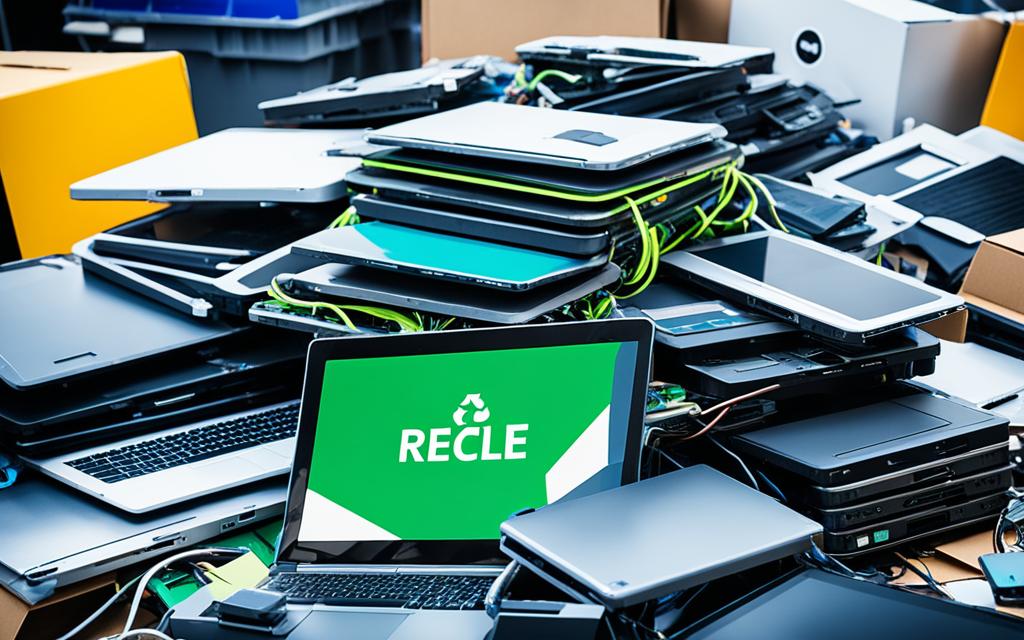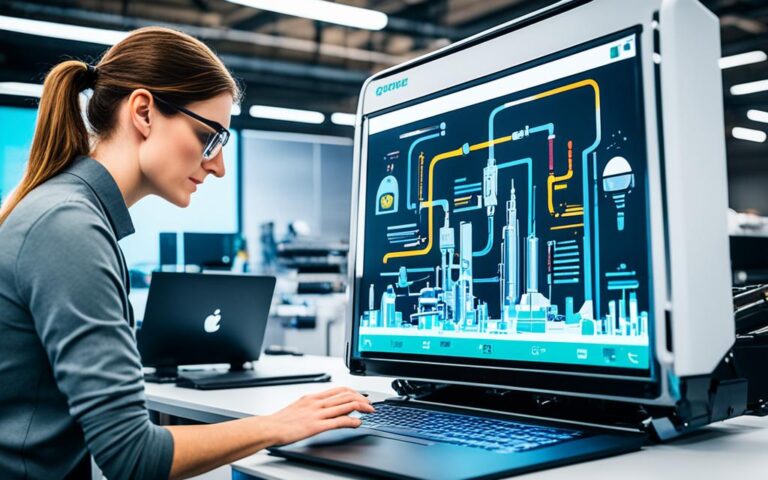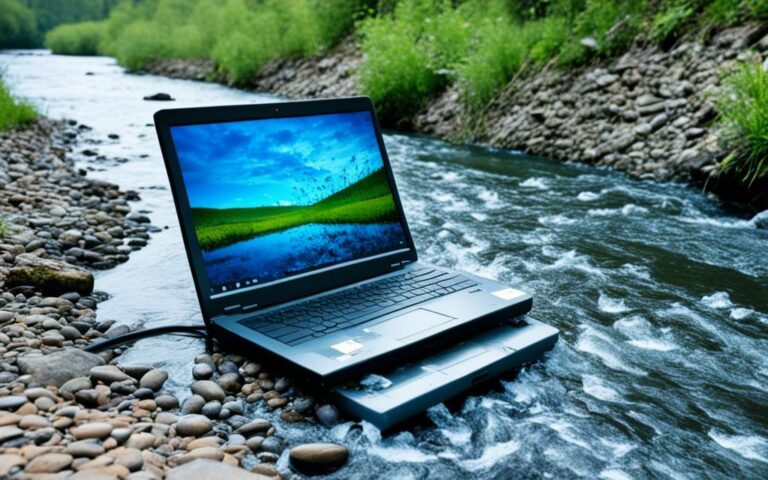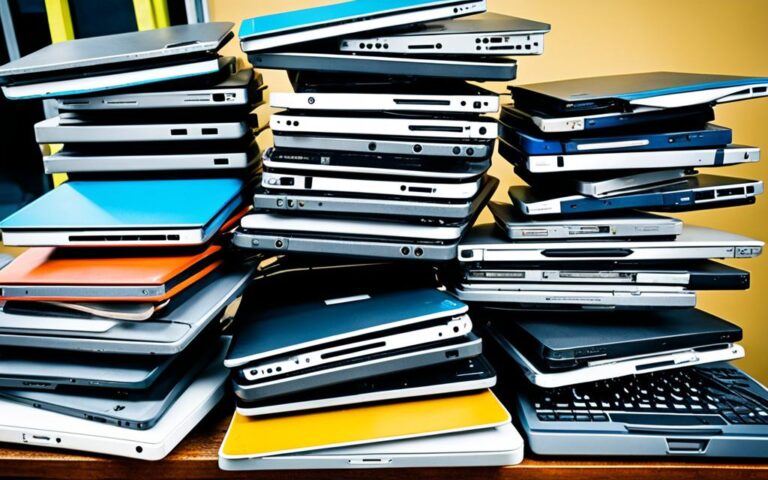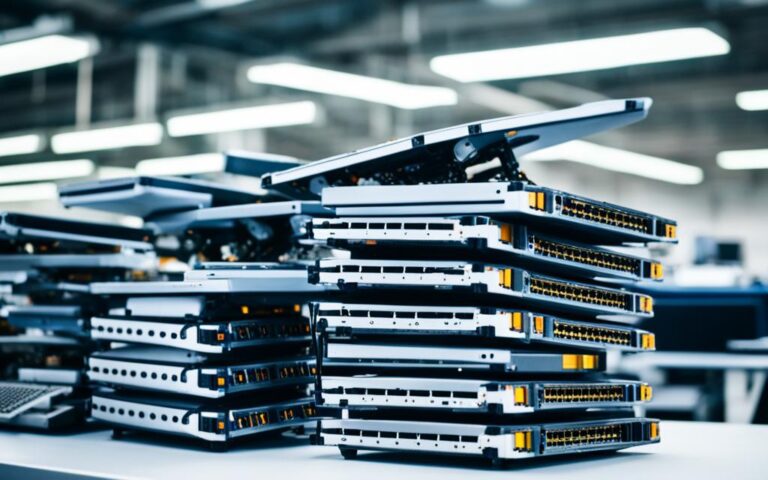The Impact of Laptop Recycling on Reducing Electronic Waste
In today’s digital age, laptops have become essential tools for work, education, and entertainment. However, the increasing use of laptops has also led to a rise in electronic waste (e-waste). The United Kingdom is the second-largest producer of e-waste globally, generating approximately 23.9kg of e-waste per capita each year.
Unfortunately, only 31.2% of this e-waste is recycled and reused, leaving a significant portion of electronic items to go to waste. This highlights the urgent need for efficient management of e-waste and greater emphasis on laptop recycling.
Laptop recycling plays a crucial role in reducing electronic waste and its harmful impact on the environment. By properly disposing of old laptops or refurbishing them for reuse, we can minimize the extraction of raw materials, conserve energy, and prevent toxic substances from entering landfills.
Additionally, laptop recycling promotes a circular economy, where valuable components from old laptops are salvaged and used in the production of new devices, reducing the need for resource-intensive manufacturing processes.
In the next sections, we will explore the reasons why we should prioritize e-waste reduction, discover practical ways to reduce electronic waste in both business and household settings, and emphasize the importance of responsible e-waste management.
Why Should We Reduce E-Waste?
The UK generates the second-highest amount of e-waste in the world, with businesses and homes producing significant volumes of electronic waste. Reducing e-waste is important as it saves on the energy and resources required to create new electronics. Additionally, many electronics contain valuable and non-renewable elements, so recycling and reusing old electricals helps avoid wasting precious materials. Reducing electronic waste not only saves money and materials but also benefits the environment.
“Every time we throw away electronic devices, we’re throwing away valuable resources. By extending the lifespan of electricals through recycling and reusing, we can conserve these resources and reduce the environmental impact of e-waste.”
To understand better, let’s take a look at the environmental impact of reducing e-waste:
| Positive Outcomes of Reducing E-Waste | Environmental Impact |
|---|---|
| Conservation of valuable and non-renewable resources | |
| Reduction in greenhouse gas emissions from production and disposal | |
| Prevention of soil, water, and air pollution caused by improper e-waste disposal |
By reducing e-waste, we can contribute to a more sustainable future and protect our environment for generations to come.
10 Ways to Reduce E-Waste
Reducing electronic waste is crucial for promoting sustainability and minimizing its environmental impact. By adopting the following practices, both households and businesses can significantly contribute to the reduction of e-waste and promote a greener future:
- Donate old electricals: Instead of discarding old electronics, consider donating them to charities or organizations that can refurbish and redistribute them to those in need.
- Remove and reuse batteries: Extend the lifespan of batteries by removing them from old devices and using them in other electronics or purchasing rechargeable batteries.
- Buy energy-efficient appliances: Opt for electronics with high energy efficiency ratings, such as ENERGY STAR certified products, to reduce energy consumption and lower e-waste.
- Recycle WEEE items: Ensure proper disposal of Waste Electrical and Electronic Equipment (WEEE) by recycling them through authorized recycling centers or collection programs.
- Regularly check devices for issues: Conduct routine maintenance and inspections to identify and address any problems with your electronics, thereby prolonging their lifespan.
- Follow manufacturer usage guidelines: Adhere to the recommended usage instructions provided by the manufacturer to prevent premature damage or malfunction of your electronic devices.
- Buy refurbished electronics: Consider purchasing refurbished electronics, which undergo rigorous testing and repairs, as a cost-effective and eco-friendly alternative to buying new.
- Clean and update equipment: Keep your devices clean from dust and debris, and regularly update their software to optimize their performance and extend their lifespan.
- Only buy what is needed: Practice mindful consumption by purchasing electronics only when necessary, thereby reducing unnecessary e-waste.
- Move to non-electronic processes: Explore alternative solutions that do not rely on electronic devices, such as using physical documents or manual tools, to minimize electronic waste.
By incorporating these ten strategies into your lifestyle or business operations, you can actively contribute to reducing e-waste and promoting a more sustainable future.
Ways of Reducing E-Waste in Your Business
In today’s digital age, businesses have a vital role to play in reducing electronic waste and minimizing their carbon footprint. By implementing sustainable practices, companies can contribute to a cleaner environment and promote a positive brand image. Here are some effective ways to reduce e-waste in your business:
- Educate Employees: Proper education is the foundation of responsible e-waste management. Train your employees on the proper and safe usage of electronic equipment to prolong their lifespan and prevent unnecessary waste.
- Hire Electronic Equipment: Rather than purchasing new electronics for short-term projects, consider hiring them. This reduces the need for constant upgrades and helps minimize the disposal of obsolete equipment.
- Sell Old Items to Staff: Instead of discarding old electronics, offer employees the opportunity to purchase them at a reasonable price. This not only reduces e-waste but also provides a cost-effective solution for your staff.
- Protective Cases and Storage Facilities: Investing in protective cases for laptops, tablets, and other electronic devices can significantly reduce the risk of damage and prolong their lifespan. Additionally, providing secure storage facilities prevents unnecessary wear and tear.
- Choose Energy-Efficient Options: When procuring new electronic equipment, prioritize energy-efficient models. These devices consume less power, resulting in lower energy costs and a reduced carbon footprint.
By implementing these measures, businesses can actively contribute to reducing e-waste in the workplace and become more sustainable and environmentally friendly.
How to Reduce Electronic Waste at Home
UK homes generate a significant amount of e-waste, such as broken toys and old appliances. To reduce electronic waste at home, individuals can take several steps that not only minimize waste but also contribute to a more sustainable environment.
1. Hold off on upgrading your phones
Instead of frequently upgrading to the latest smartphone model, consider using your current phone for a longer period. By maximizing the lifespan of your phone, you reduce the demand for new devices, ultimately decreasing e-waste.
2. Reuse old phones for different purposes
If you have an old phone that still functions, repurpose it for other uses. It can serve as a secondary device for tasks like music streaming, gaming, or as a dedicated e-reader. Reusing old phones instead of letting them gather dust in a drawer helps extend their usefulness.
3. Sell items online
Before disposing of your old electronics, explore online selling platforms where you can find buyers willing to purchase them. You may be surprised at the demand for second-hand electronics, allowing you to earn some extra money while also reducing e-waste.
4. Fix broken devices instead of throwing them away
If you encounter issues with your electronic devices, consider getting them repaired instead of immediately replacing them. Many repair services are available for smartphones, laptops, and other electronic appliances. Repairing items not only saves money but also prevents unnecessary waste.
5. Properly dispose of or recycle electronics
When it is time to dispose of your old electronics, make sure to follow proper recycling protocols. Check for local recycling centers or municipal collection events where you can drop off your e-waste. This ensures that valuable resources are recovered and reused, reducing the environmental impact of electronic waste.
Reducing electronic waste at home is a collective effort that contributes to a more sustainable future. By making conscious choices, reusing, repairing, and recycling electronic devices, you can actively participate in reducing e-waste and protecting the environment.
Implementing these strategies can significantly lower the amount of waste electricals created domestically, leading to a positive impact on the overall reduction of e-waste. By taking responsible actions at home, each individual becomes a part of the solution in creating a more sustainable and eco-friendly society.
Conclusion
Proper management of e-waste, including laptop recycling, is crucial for reducing electronic waste and minimizing its environmental impact. By adopting practices such as donating, reusing, and recycling old electricals, businesses and individuals can contribute to the reduction of e-waste. Responsible e-waste disposal ensures resource conservation, environmental preservation, and a positive brand image.
To further support e-waste reduction efforts, businesses can consider partnering with certified e-waste recyclers, such as Plexstar, to ensure sustainable and secure disposal of electronic waste. By choosing a reputable recycling partner, businesses can trust that their e-waste will be handled in compliance with regulations and ethical guidelines, avoiding any harm to the environment and public health.
Laptop recycling plays a significant role in the broader objective of e-waste reduction. As laptops are among the most commonly used electronic devices, recycling them properly can help prevent them from ending up in landfills or being illegally exported to developing countries. Furthermore, the recycling process allows for the recovery of valuable materials, such as metals and plastics, which can then be reused in the production of new products, reducing the need for raw materials extraction.
In conclusion, embracing laptop recycling and other e-waste reduction practices is not only environmentally responsible but also economically advantageous. It allows businesses and individuals to contribute to a more sustainable future while also promoting a positive brand image and fulfilling corporate social responsibility. By taking steps towards proper e-waste management, we can ensure that the impact of electronic waste on our environment is minimized, and valuable resources are conserved for future generations.
FAQ
Why is it important to reduce e-waste?
Reducing e-waste is important because it saves on the energy and resources required to create new electronics. It also helps avoid wasting valuable and non-renewable elements found in many electronic devices. Additionally, reducing electronic waste saves money, materials, and benefits the environment.
What are some ways to reduce electronic waste?
There are several ways to reduce electronic waste, including donating old electricals, removing and reusing batteries, buying energy-efficient appliances, recycling WEEE items, regularly checking devices for issues, following manufacturer usage guidelines, buying refurbished electronics, cleaning and updating equipment, only buying what is needed, and moving to non-electronic processes.
How can businesses reduce e-waste?
Businesses can reduce e-waste by educating employees on proper and safe usage of electronic equipment, hiring electronic equipment when needed, selling old items to staff, looking after electronics by using protective cases and storage facilities, and buying energy-efficient options for the future. Implementing these practices can help businesses become more sustainable and environmentally friendly.
What can individuals do to reduce electronic waste at home?
To reduce electronic waste at home, individuals can hold off on upgrading their phones, reuse old phones for different purposes, sell items online, fix broken devices instead of throwing them away, and properly dispose of or recycle electronics. These steps can lower the amount of waste electricals created domestically and contribute to reducing e-waste overall.
Why is proper management of e-waste important?
Proper management of e-waste, including laptop recycling, is crucial for reducing electronic waste and minimizing its environmental impact. Responsible e-waste disposal ensures resource conservation, environmental preservation, and a positive brand image. Businesses and individuals can contribute to the reduction of e-waste by adopting practices such as donating, reusing, and recycling old electricals.
How can businesses ensure sustainable e-waste disposal?
Businesses can ensure sustainable e-waste disposal by partnering with certified e-waste recyclers, such as Plexstar. This helps businesses to properly dispose of their electronic waste in a secure and environmentally friendly manner.

